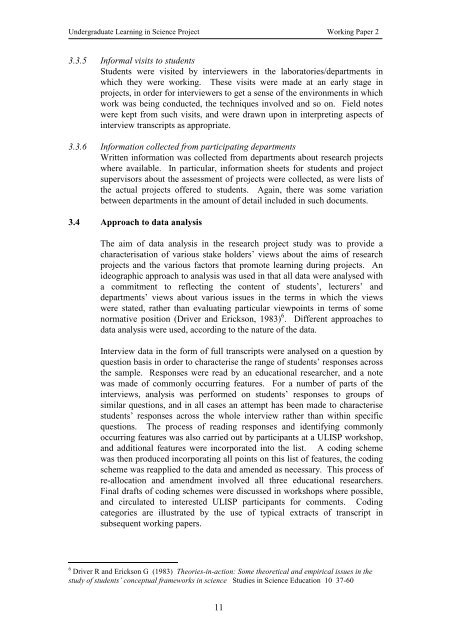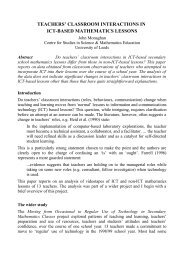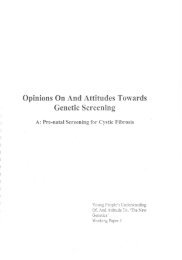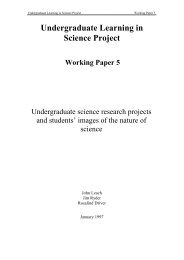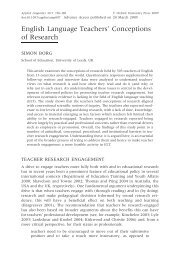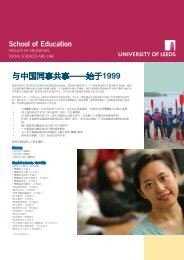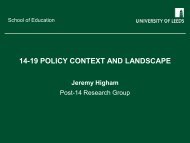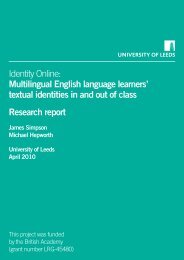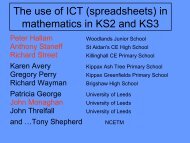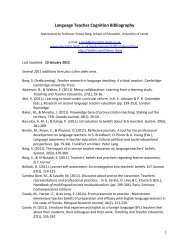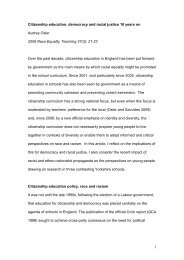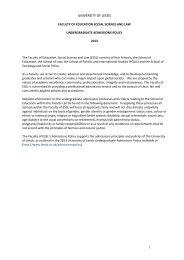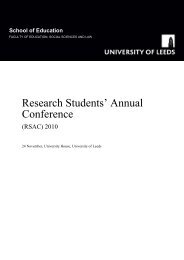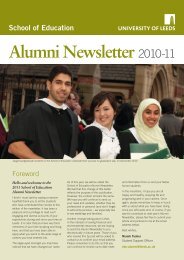The Research Project Study: Design and Methodology - School of ...
The Research Project Study: Design and Methodology - School of ...
The Research Project Study: Design and Methodology - School of ...
You also want an ePaper? Increase the reach of your titles
YUMPU automatically turns print PDFs into web optimized ePapers that Google loves.
Undergraduate Learning in Science <strong>Project</strong> Working Paper 23.3.5 Informal visits to studentsStudents were visited by interviewers in the laboratories/departments inwhich they were working. <strong>The</strong>se visits were made at an early stage inprojects, in order for interviewers to get a sense <strong>of</strong> the environments in whichwork was being conducted, the techniques involved <strong>and</strong> so on. Field noteswere kept from such visits, <strong>and</strong> were drawn upon in interpreting aspects <strong>of</strong>interview transcripts as appropriate.3.3.6 Information collected from participating departmentsWritten information was collected from departments about research projectswhere available. In particular, information sheets for students <strong>and</strong> projectsupervisors about the assessment <strong>of</strong> projects were collected, as were lists <strong>of</strong>the actual projects <strong>of</strong>fered to students. Again, there was some variationbetween departments in the amount <strong>of</strong> detail included in such documents.3.4 Approach to data analysis<strong>The</strong> aim <strong>of</strong> data analysis in the research project study was to provide acharacterisation <strong>of</strong> various stake holders’ views about the aims <strong>of</strong> researchprojects <strong>and</strong> the various factors that promote learning during projects. Anideographic approach to analysis was used in that all data were analysed witha commitment to reflecting the content <strong>of</strong> students’, lecturers’ <strong>and</strong>departments’ views about various issues in the terms in which the viewswere stated, rather than evaluating particular viewpoints in terms <strong>of</strong> somenormative position (Driver <strong>and</strong> Erickson, 1983) 6 . Different approaches todata analysis were used, according to the nature <strong>of</strong> the data.Interview data in the form <strong>of</strong> full transcripts were analysed on a question byquestion basis in order to characterise the range <strong>of</strong> students’ responses acrossthe sample. Responses were read by an educational researcher, <strong>and</strong> a notewas made <strong>of</strong> commonly occurring features. For a number <strong>of</strong> parts <strong>of</strong> theinterviews, analysis was performed on students’ responses to groups <strong>of</strong>similar questions, <strong>and</strong> in all cases an attempt has been made to characterisestudents’ responses across the whole interview rather than within specificquestions. <strong>The</strong> process <strong>of</strong> reading responses <strong>and</strong> identifying commonlyoccurring features was also carried out by participants at a ULISP workshop,<strong>and</strong> additional features were incorporated into the list. A coding schemewas then produced incorporating all points on this list <strong>of</strong> features, the codingscheme was reapplied to the data <strong>and</strong> amended as necessary. This process <strong>of</strong>re-allocation <strong>and</strong> amendment involved all three educational researchers.Final drafts <strong>of</strong> coding schemes were discussed in workshops where possible,<strong>and</strong> circulated to interested ULISP participants for comments. Codingcategories are illustrated by the use <strong>of</strong> typical extracts <strong>of</strong> transcript insubsequent working papers.6 Driver R <strong>and</strong> Erickson G (1983) <strong>The</strong>ories-in-action: Some theoretical <strong>and</strong> empirical issues in thestudy <strong>of</strong> students’ conceptual frameworks in science Studies in Science Education 10 37-6011


